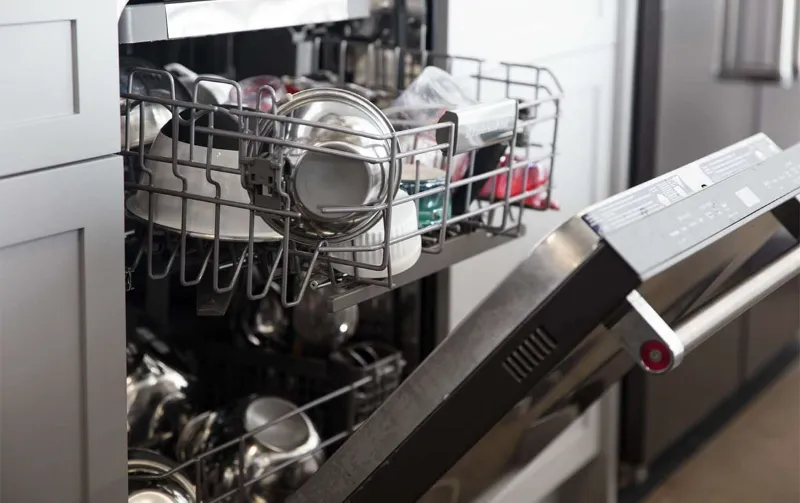Stainless steel should not be placed in the dishwasher because it can cause discoloration and damage to the material. The high heat and harsh detergents in the dishwasher can lead to tarnishing and corrosion on the stainless steel surfaces, affecting their appearance and durability.
Additionally, the strong water pressure and abrasive action within the dishwasher can cause scratches and pitting on the metal, further diminishing its quality and shine.
It’s essential to carefully hand wash and dry stainless steel items to maintain their pristine condition and prolong their lifespan.
By following these simple care practices, you can ensure that your stainless steel remains in excellent condition for years to come, free from the detrimental effects of dishwasher cleaning.

Understanding The Potential Damage
Corrosion Risks
When stainless steel items are placed in the dishwasher, they are exposed to harsh detergents and high temperatures, leading to potential corrosion risks.
The alkaline nature of dishwasher detergents combined with the high heat can cause corrosion on stainless steel surfaces.
This corrosion can compromise the integrity of the items, leading to a shorter lifespan and potential performance issues.
Discoloration Issues
Another potential problem when putting stainless steel in the dishwasher is the risk of discoloration.
The high heat and chemical reactions with the dishwasher detergents can cause unsightly discoloration on the stainless steel surfaces, affecting their appearance and overall aesthetics.
This can be particularly noticeable in items like cutlery, cookware, and kitchen appliances, detracting from their visual appeal.
Factors Affecting Stainless Steel
Harsh Detergents
When stainless steel items are subjected to harsh detergents, they can become tarnished and lose their luster.
The abrasive properties of these detergents can create microscopic scratches on the surface of the steel, leading to a dull appearance over time.
Additionally, the chemical composition of the detergents can react with the stainless steel, causing discoloration and corrosion.
High Water Temperatures
Exposure to high water temperatures in the dishwasher can have detrimental effects on stainless steel.
The heat from the water can cause the steel to expand and contract rapidly, leading to warping or distortion of the items.
Furthermore, prolonged exposure to high temperatures can accelerate the oxidation process, resulting in rust formation on the stainless steel surfaces.
Alternatives To Dishwasher Cleaning
When it comes to cleaning stainless steel, many people wonder why they can’t just toss it in the dishwasher.
Stainless steel can’t withstand the high heat and strong detergents in dishwashers, which can cause it to lose its luster and even corrode over time.
But fear not, there are alternative cleaning methods that can help you keep your stainless steel looking shiny and new.
Hand Washing Techniques
When it comes to hand washing stainless steel, using mild dish soap and warm water is the best approach.
Avoid using abrasive sponges or steel wool, as they can leave scratches on the surface.
Instead, opt for a soft cloth or a non-abrasive sponge to gently scrub away any dirt or grime.
Be sure to rinse thoroughly with clean water and dry the stainless steel item immediately to prevent water spots and stains.
Proper Drying Methods
After hand washing your stainless steel items, it’s crucial to dry them properly to prevent water spots and streaks.
Use a clean, lint-free towel to dry the items thoroughly, making sure to follow the grain of the stainless steel to avoid leaving behind any streaks.
For larger items, air drying can be effective, but be sure to wipe away excess water with a soft cloth before leaving them to air dry.
Preserving The Shine Of Stainless Steel
Polishing And Buffing
Stainless steel can lose its luster over time due to regular use and exposure to harsh detergents in the dishwasher.
Polishing and buffing the stainless steel surfaces will help to restore its shine and maintain the overall appearance.
Avoid using abrasive cleaners or steel wool during this process, as they can cause fine scratches and dull the surface.
Regular maintenance will keep your stainless steel looking like new for longer.
Protecting Against Scratches
Preventing scratches in stainless steel is crucial for preserving its shine.
Avoid stacking metal items or sharp utensils that could potentially damage the surface.
Using protective films or pads in the dishwasher can act as a barrier between the stainless steel and other items, thus reducing the risk of scratches.
Additionally, always follow the manufacturer’s guidelines for dishwasher loading to ensure that items are placed correctly to prevent contact and potential scratches.
Frequently Asked Questions Of Why Can’t You Put Stainless Steel In The Dishwasher
Why Should You Not Put Stainless Steel In The Dishwasher?
Stainless steel can corrode due to harsh detergents and high heat in the dishwasher.
How Does The Dishwasher Damage Stainless Steel Items?
The agitation and friction in the dishwasher can cause scratches and dull the finish.
Can I Clean Stainless Steel In The Dishwasher?
Hand washing with a mild detergent and soft cloth is recommended for stainless steel.
What Are The Best Practices For Washing Stainless Steel Items?
It is best to hand wash stainless steel items to maintain their quality and appearance.
Conclusion
It’s advised not to put stainless steel items in the dishwasher due to potential damage from detergent and high temperatures.
Hand washing is recommended to maintain the integrity and appearance of your stainless steel kitchenware.
It’s important to follow proper care instructions to ensure their longevity and performance.
